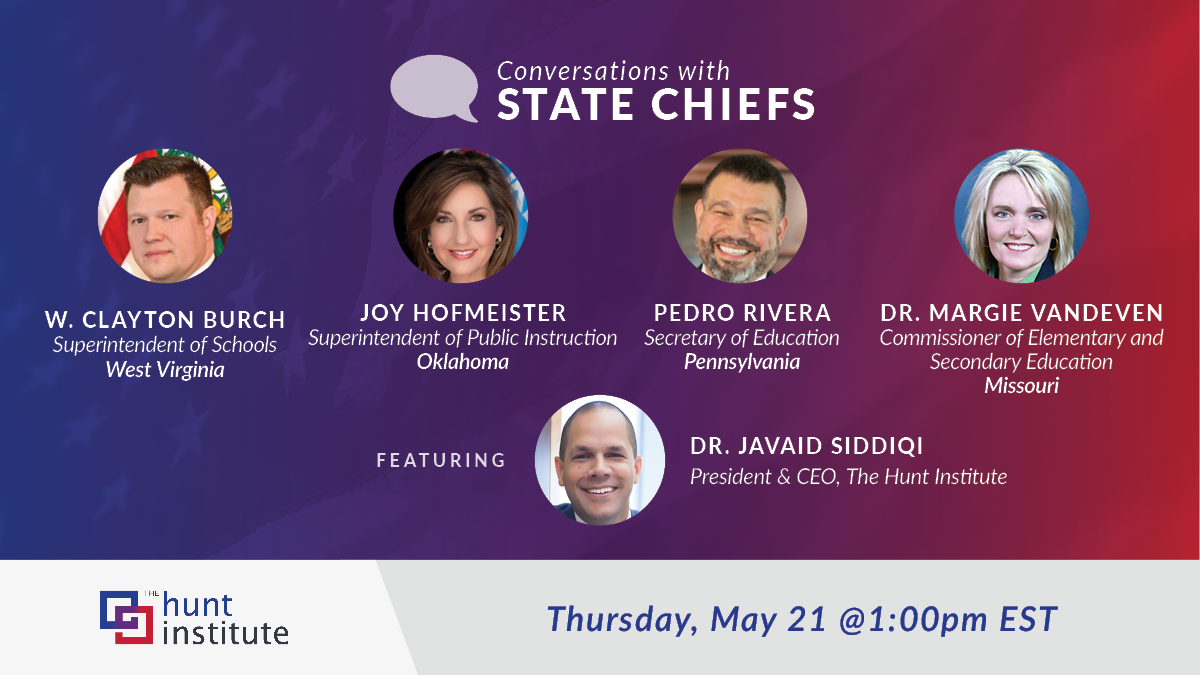Homeroom with Education Leaders: Supporting Student Growth
June 8, 2020

Episode four of Conversations with State Chiefs was titled Supporting Student Growth Amid School Closures, and featured Superintendent Clayton Burch of West Virginia, Superintendent Joy Hofmeister of Oklahoma, Secretary Pedro Rivera of Pennsylvania, and Commissioner Margie Vandeven of Missouri. Additionally, Dr. Javaid Siddiqi, President & CEO of The Hunt Institute provided his insight as a resource expert. Throughout the conversation, the four panelists often brought up the idea of “the whole child,” or the idea that in order for students to learn to the best of their ability, we must think about their needs holistically and not in an academic bubble. They agreed that acknowledging the whole child and meeting the social-emotional and physical needs of students in addition to their academics is essential in supporting student growth during remote learning.
Student growth can mean so many things—academic achievement, social development, emotional maturation, commitment to community, and service, among other topics. Interruptions in student learning from COVID-19 have presented new challenges for educators as they attempt to cultivate student growth. Teachers are particularly worried about student learning loss from students being out of school for an extended period of time. Superintendent Burch pointed out that as educators and school staff plan for the upcoming academic year over the summer, they must discuss how they plan to address learning loss after a COVID-slide. Superintendent Hofmeister spoke about Oklahoma schools attempting to gather more data to see what academic areas need to be strengthened or reviewed for the fall. Already, Oklahoma signed a statewide contract for schools to access Exact Path for free. Exact Path combines adaptive diagnostic assessments with individualized learning pathways to promote growth for K-12 students in math, reading, and language arts. Moreover, Commissioner Vandeven mentioned Missouri is looking to test students early on so that value-added assessment models could be used to measure student growth. With this in mind, what have states done to support student growth during school closures?
Creating Supportive Learning Environments
In addition to student learning loss, mental health challenges have been at the forefront of discussions surrounding student growth concerns during this pandemic. When schools reopen, students and teachers could potentially carry into the classroom trauma or stress created by the pandemic, the associated social isolation, and the sudden change in routines. Many also expect that the civil unrest we have been seeing around the country will have a profound impact on the mental health and wellbeing of students, particularly Black students. In response, schools have been actively trying to create supportive learning environments for students. In West Virginia and Oklahoma, teachers have been encouraged to reach out to students outside of scheduled class meetings through phone calls or emails. A concern that educators have is student absenteeism from online learning. They want to ensure that there is at least one caring adult reaching out to students and that academic progression of students is equally weighted with the mental wellbeing of students.
In Missouri, teacher advisory committees have been created to help train and support teachers in meeting the needs of students. In Pennsylvania, every K-12 student has access to an online platform that provides a space for students to process how they feel, connect with peers and teachers, and set up office hours if needed. Around 400,000 students are already using the online platform statewide. Secretary Rivera expressed his appreciation of school personnel across the state rising to the challenge to provide support to students and families, beaming while speaking about his son’s third grade virtual field trip in his family living room. Educators are creatively brainstorming ways to promote online engagement and provide support for student needs.
Facilitating Greater Community Collaboration
Student growth requires students to have access to necessary resources for remote learning. Each community, however, has its own personalized needs. Local districts and state officials must be in communication with one another to strategize how to best meet the needs of each community.
In West Virginia, Superintendent Clayton spoke about how community collaboration is essential in identifying where gaps in resources exist. Oklahoma hopes to work with local communities to serve meals to families over the summer and install technology and internet hotspots in daycare centers and boys and girls clubs. Secretary Rivera highlighted how communities are needed now more than ever to educate our children, and that school closures represent a unique opportunity for parents to be more hands-on with their child’s education. He believes firmly that he is now in tune to what his two children are learning more than he has been in the past few years. In Missouri, Commissioner Vandeven described it as an “all hands-on deck” effort between state officials and community members to support students and their families. Nurses are working with local health officials to think about how to serve students and provide telehealth services, librarians have put together virtual read-alouds, and counselors have created resources for SEL students and their families. So far, with the aid of school bus drivers, Missouri has served over 5.4 million meals to families.
All of our panelists — Superintendent Clayton Burch of West Virginia, Superintendent Joy Hofmeister of Oklahoma, Secretary Pedro Rivera of Pennsylvania, and Commissioner Margie Vandeven of Missouri — had great insights into what their states are doing to support student growth during school closures and what they plan to do to continue that growth in the upcoming school year. Above all, when thinking about student learning loss and brainstorming ways of getting students back on track when they return to school, it is important to prioritize policies that meet the needs of all students. Addressing inequities through community and state-level partnerships is especially important in supporting the needs of all students during this pandemic.


